We as Indians are constantly surrounded by threats from both our neighboring countries China and Pakistan. Today, the situation is such that we are facing terrorism threats from Pakistani “born and bred” Terrorists constantly. The recent attacks in Jammu and Kashmir (especially Jammu) are a major concern for the Indian army and the Indian government. However, unlike other nations that try to bully India and our government from the Globe, Pakistan is a country that has been shown its place again and again by their Indian counterparts.
PM Modi addressed the threat from the “begging Bowl of the World” (Pakistan for short). His message to the Pakistan Army and political class was simple and clear.
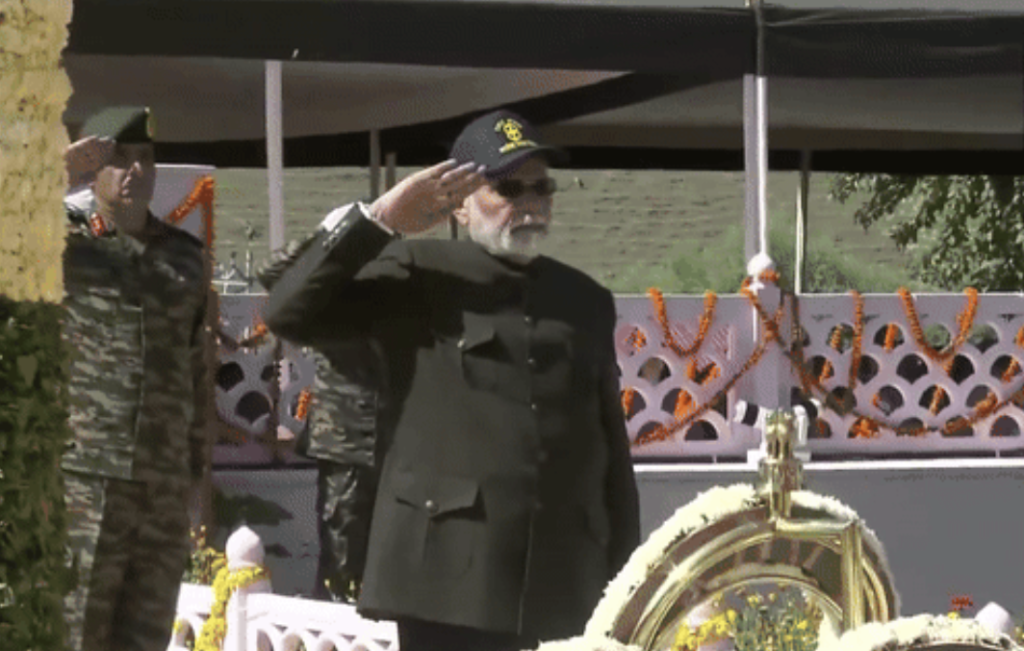
Modi’s Warning to the Pakistan System and Authorities!
Prime Minister Narendra Modi said on Friday that Pakistan “Pakistan has not learned from its history despite its failures” and that it is trying to “keep itself relevant through terrorism and proxy wars”.
Prime Minister Modi, while addressing a gathering of people and Retired Indian Officers and their families in Drass, said, “I am speaking from a point where terror masters can hear me directly. I would like to tell them that their nefarious designs will never succeed and our brave forces will crush terrorism. The enemy will be given a forceful response.”
His words echoed in the ears of the Pakistani army and their spineless politicians and they have started calling it a rhetoric. Again, they forget that they are dealing with a NEW INDIA. Their terrorists and their army have been defeated hundreds of times but they still don’t learn.
PM’s Tribute to the fallen:
In a heartfelt tribute to the soldiers who sacrificed their lives during the Kargil War, the Prime Minister emphasized that the nation owes an immense debt of gratitude to these brave heroes. He highlighted that even during the tumultuous times of the Kargil conflict, India remained committed to pursuing peace, in stark contrast to Pakistan’s cynical character.
The Prime Minister underscored that the victory in Kargil transcends political affiliations, belonging not to any single party, but to the entire nation. He remarked that the courage and resilience displayed by the soldiers continue to inspire and unite the country, reinforcing the values of patriotism and unity. This remembrance serves as a solemn reminder of the cost of freedom and the enduring spirit of those who fought valiantly for the nation’s sovereignty.
The 25th anniversary of the Kargil War, also known as Kargil Vijay Diwas, marked a significant moment in Indian history. Prime Minister Narendra Modi’s powerful address highlighted India’s unwavering stance against Pakistani aggression. This article delves into the historical context of the Kargil War, its aftermath, and the implications of PM Modi’s recent warning to Pakistan.
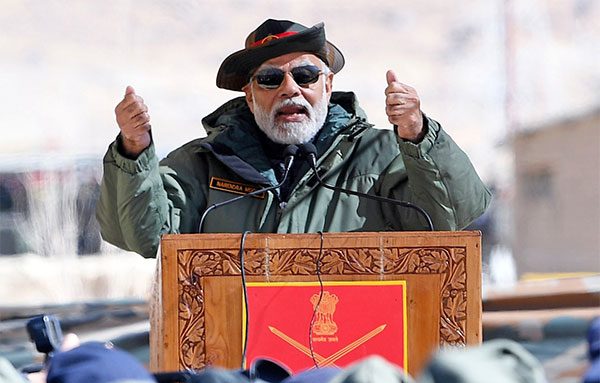
History of the Kargil War
The Kargil War of 1999 stands as a significant chapter in the history of the conflict between India and Pakistan. This war erupted primarily in the Kargil district of Jammu and Kashmir when Pakistani soldiers and Pakistani terrorists infiltrated Indian territory, seizing control of strategic heights. This unprovoked aggression by the Pakistan Army resulted in a fierce and intense conflict, marked by significant casualties on both sides.
The infiltration was a calculated move by Pakistan to cut off the vital link between the Kashmir Valley and Ladakh, thereby forcing India to negotiate on Kashmir. In response to this blatant violation of territorial integrity, the Indian Army, supported by the Indian Air Force and the Indian Navy, launched Operation Vijay to reclaim the occupied territories. The operation showcased the exceptional bravery and resilience of the Indian armed forces as they fought in the harshest of terrains and conditions to push back the intruders.
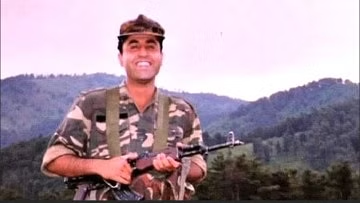
The infiltration was a calculated move by Pakistan to cut off the vital link between the Kashmir Valley and Ladakh, thereby forcing India to negotiate on Kashmir. In response to this blatant violation of territorial integrity, the Indian Army, supported by the Indian Air Force and the Indian Navy, launched Operation Vijay to reclaim the occupied territories. The operation showcased the exceptional bravery and resilience of the Indian armed forces as they fought in the harshest of terrains and conditions to push back the intruders.
The conflict drew widespread international attention and concern. India faced immense international pressure, particularly from key global players, to exercise restraint and seek a diplomatic resolution. Countries like the United States and other Western nations were keen on preventing a full-scale war between the two nuclear-armed neighbours. Despite the pressure, India maintained its stance, emphasizing the need to uphold its sovereignty and territorial integrity.
During the war, the Indian government also worked tirelessly on the diplomatic front to expose Pakistan’s role in the conflict. Indian officials presented compelling evidence to the international community, demonstrating that the infiltrators were not mere militants but regular Pakistani soldiers. This diplomatic effort was crucial in garnering international support and isolating Pakistan on the global stage.
The war saw the use of air power by the Indian Air Force for the first time in the region since the Indo-Pakistani War of 1971. The Indian Navy was also put on high alert to deter any potential threats from the sea. The combined efforts of the Indian armed forces eventually led to the successful recapture of the heights, culminating in India’s victory.
The Kargil War not only exposed the duplicity of the Pakistan Military but also highlighted the indomitable spirit of the Indian Army. The conflict reaffirmed India’s commitment to defending its borders and served as a stark reminder of the cost of maintaining peace and security. The bravery and sacrifice of the Indian soldiers during Operation Vijay continue to be remembered and honored, especially on Kargil Vijay Diwas, marking a pivotal moment in India’s military history.
Analysis of the Kargil War Results
The Kargil War, fought between India and Pakistan in the summer of 1999, concluded with a decisive victory for India. Despite facing formidable challenges, including treacherous terrain and harsh weather conditions, the Indian Army demonstrated exceptional resilience and strategic acumen. Through a series of well-coordinated military operations, India managed to push back the Pakistani terrorists who had infiltrated high-altitude positions in the Kargil district of Jammu and Kashmir.
The conflict, commemorated annually as Kargil Vijay Diwas on July 26, not only marked a significant military achievement for India but also exposed the duplicity of Pakistani politicians and the Pakistan Military, who initially attempted to downplay or deny their involvement in the conflict. This denial was met with skepticism from the international community, and as evidence of the Pakistan Army’s role mounted, the country faced significant diplomatic fallout. The exposure of Pakistan’s actions led to widespread condemnation from global leaders and institutions, resulting in a period of increased isolation for Pakistan on the international stage.
The global perception of Pakistan shifted notably in the aftermath of the Kargil War. Prior to the conflict, Pakistan had managed to maintain a certain level of diplomatic rapport and support from various quarters. However, the war’s revelations and the subsequent evidence of Pakistan’s military involvement in a disputed territory severely tarnished its international image. Reports from prominent news outlets, such as The New York Times and The Guardian, highlighted the breach of trust and the questionable legitimacy of Pakistan’s stance on regional conflicts. This negative spotlight contributed to a cooling of diplomatic relations and a reassessment of Pakistan’s role in regional security dynamics.
The Indian Prime Minister at the time, Atal Bihari Vajpayee, and his successor, PM Modi, have both been instrumental in commemorating the Kargil War and its significance. The Indian Navy and the Indian Air Force also played critical roles in the conflict, showcasing the comprehensive strength and coordination of India’s defense forces.
As we approach the 25th Anniversary of the Kargil War, it serves as a reminder of India’s military prowess and the shifting global perceptions of Pakistan. The international community’s response to the war played a crucial role in shaping subsequent diplomatic interactions and regional politics, influencing how Pakistan was viewed and engaged with by other nations in the years that followed.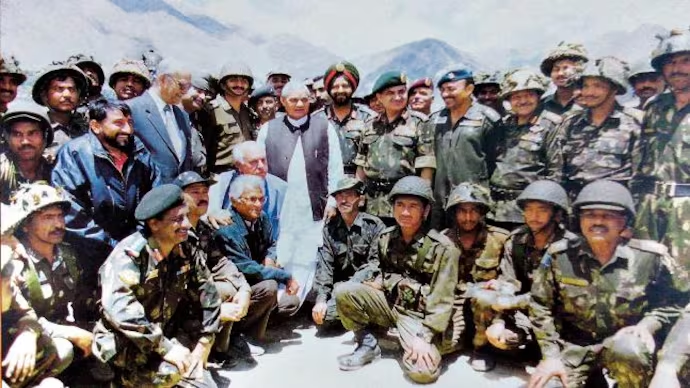
What Happened to Pakistan After the War?
In the aftermath of the Kargil War, Pakistan found itself mired in political turmoil and economic instability. The conflict inflicted severe damage on the credibility of both the Pakistan Army and the nation’s political leaders. The disastrous outcome of the war, coupled with exposed military blunders, led to a significant loss of trust among the Pakistani populace and the international community.
The situation deteriorated further when General Pervez Musharraf orchestrated a military coup in 1999, overthrowing the civilian government. This coup underscored the deep internal chaos and the fragile state of Pakistan’s democracy. The military takeover was a stark indicator of the power struggles and instability within the country.
Economically, Pakistan faced a daunting challenge. The war and its aftermath brought about international sanctions and a severely tarnished global image. These sanctions, along with the loss of international goodwill, hampered Pakistan’s development and economic growth for years. The nation’s already struggling economy was further strained, leading to widespread hardship and a slowdown in progress.
Adding to its woes, Pakistan’s attempts to spread false narratives about India on the international stage backfired. Pakistani officials tried to project India as the aggressor, spreading misinformation to garner international sympathy and support. However, these lies were quickly debunked by credible international observers and media. The truth about Pakistan’s role in initiating the conflict and its subsequent military failures became widely known, further isolating the country diplomatically.
The combination of political instability, economic challenges, and failed propaganda efforts left Pakistan in a precarious position. The Kargil War not only exposed the weaknesses within the Pakistani establishment but also highlighted the resilience and determination of India. For Pakistan, the post-war years were a period of introspection and struggle, as it sought to recover from the self-inflicted wounds of a misguided military adventure.
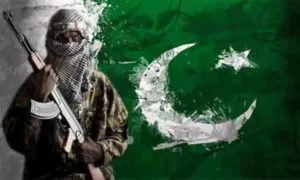
War Against Terrorism
Prime Minister Narendra Modi underscored India’s relentless and multifaceted efforts in the ongoing war against terrorism, with a particular focus on combating cross-border terrorism orchestrated and supported by Pakistan. He detailed the comprehensive and stringent measures implemented by the Indian government to prevent infiltration and enhance the nation’s security apparatus. This includes bolstering border defenses, increasing surveillance, and employing advanced technology to thwart terrorist activities.
The Prime Minister conveyed an unequivocal message to Pakistan: the support and sponsorship of terrorism will lead to severe and far-reaching consequences. India’s stance against terrorism is unwavering, and it is prepared to take all necessary actions to safeguard its citizens and maintain national security. By fortifying its counter-terrorism strategies, India aims to dismantle terrorist networks and deter future threats.
Moreover, PM Modi highlighted the collaborative efforts with international allies to combat global terrorism, emphasizing the importance of international cooperation in this fight. He reiterated that India’s battle against terrorism is not just for the safety and security of its own people but is also a critical component of global peace and stability. The Prime Minister’s statements reflect a strong and proactive approach, signaling India’s determination to eradicate terrorism and uphold the principles of justice and peace.
Final Warning to Pakistan? Is Modi Cabinet Planning Something BIG?
In a stern and unequivocal warning, the Indian Prime Minister made it clear that Pakistan’s attempts to destabilize India would be countered with a formidable response on both diplomatic and military fronts. Prime Minister Narendra Modi emphasized that India’s defense strategy is not limited to military action alone; it encompasses a comprehensive and proactive approach to ensure national security.
He asserted that any future misadventures by the Pakistan Army or terrorist groups operating from Pakistani soil would be met with decisive and robust retaliation. The Prime Minister’s remarks reflect the Indian government’s unwavering commitment to safeguarding its sovereignty and maintaining regional stability. This proactive stance is designed to deter any hostile actions and reinforce India’s readiness to defend its borders and uphold peace. The message is clear: India will not tolerate any threats to its security and will take all necessary measures to protect its citizens and its territory.
Our Opinion:
We have been saying this for over a decade now but all our words have been falling on deaf ears. Pakistan needs to be taught a lesson. They are not a country but a herd of people who will follow anyone in the name of religion. Their main aim remains to destroy their neighboring country India.
Forgetting who sits in the Prime Minister’s chair now, they keep on sending terrorists through the porous India-Pakistan border and our officers keep sending them where they belong. On Friday, PM Modi told them what they can expect from India.
But with this article, we want to ask our government the same thing. When will our soldiers stop dying because of the same reasons? When will India take decisive action against a ‘Terrorist Infested’ nation like Pakistan?
PM Modi’s stern warning to Pakistan underscores India’s commitment to safeguarding its borders and combating terrorism. As India honors its heroes and remembers their sacrifices, the message to Pakistan is clear: any aggression will be met with unwavering determination and strength. All we need from our PM is to be decisive now.
We have all the power in the world. Plus, we have been attacked several times by this same predatory nation. Why can’t we start something against them for a change?
Hoping SOMEONE does something about this problem ASAP!
Till then
This is Team New India
Signing off…
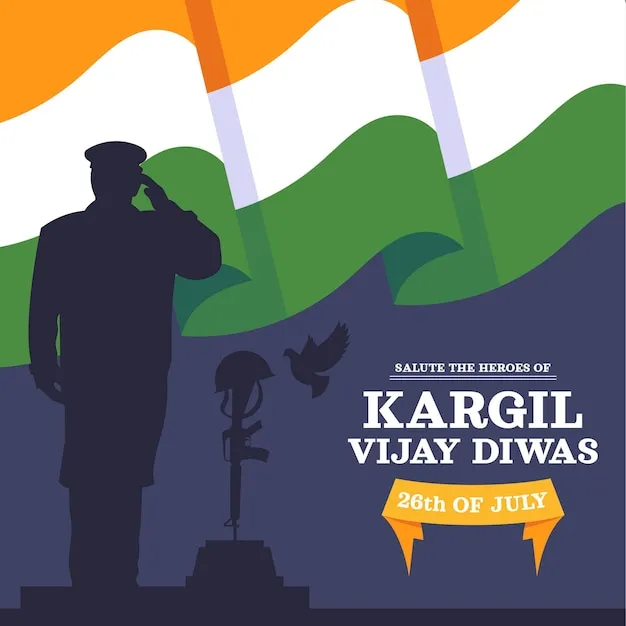
Leave a Reply